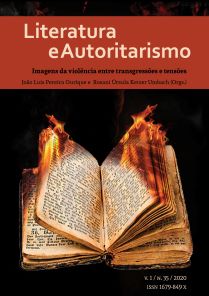The real, the violent and the revenge in the short story “Putas Asesinas”, by Roberto Bolaño
DOI:
https://doi.org/10.5902/1679849X42606Keywords:
Violence, Revenge, Putas Asesinas, Roberto Bolaño.Abstract
This article aims to undertake an analysis of the story "Putas Asesinas", by Roberto Bolaño, present in the collection of short stories also titled Putas Asesinas, first published in 2001. The story shows the narrative of a prostitute and his involvement with a man named Max, as well as the torture and death of the character. In the analysis we will address issues that revolve around the violence and revenge present in the story. Xavier Crettiez (2009), affirms that defining violence as a set of themes and feats that are easily resembled is impossible, since violence presents itself in multiple forms. In the story, we perceive the strata of violence as an integral part of the social apparatus, without which, perhaps, it would not be possible for society to exist, as well as part of man himself, to this extent we focus on the attitudes that led the main character of the story to avenge In addition to critical and theoretical concepts related to literary aesthetics, we will also contribute to studies related to perversity, cruelty and violence, such as A parte obscura de nós mesmos: uma história dos perversos, by Elisabeth Roudinesco, La ética de la crueldade, by José Ovejero, Literatura e Violência, by Ronaldo Lima Lins, Las Formas de la Violencia, by Xavier Crettiez e Literatura, violência e melancolia, by Jaime Ginzburg, among others.Downloads
References
ANSPACH, Mark. Anatomia da Vingança: figuras elementares de reciprocidade. Trad. Margarita Maria Garcia Lamelo. São Paulo: É Realizações, 2012.
BARTHES, Roland. O prazer do texto. Trad. J. Guinsburg, 3. ed. São Paulo: Perspectiva, 2002.
BOLAÑO, Roberto. Putas aseninas. Barcelona: Vintage Español, 2017.
BROTHERSTON, Gordon. La visión americana de la conquista. In: PIZARRO, Ana. América Latina: palabra, literatura e cultura. Campinas: Unicamp,1993.
CANDIDO, Antonio. Literatura e Sociedade. Rio de Janeiro: Ouro sobre azul, 2014.
CRETTIEZ, Xavier. Las formas de la violencia. Buenos Aires: Waldhuter, 2009.
GALEANO, Eduardo. La venas abiertas de América Latina. Barcelona: Siglo Veintiuno Editores, 2011.
GINZBURG, Jaime. Literatura, violência e melancolia. Campinas, SP: Autores Associados, 2012.
GRAMUGLIO, Maria Teresa. El imperio realista. Tomo 6. Noé Jitrik (Dir.) Historia crítica de la literatura argentina. Buenos Aires: Emecé, 2002.
HOBBES, Thomas. O Leviatã. Trad. João Paulo Monteiro e Maria Beatriz Nizza da Silva. São Paulo: Martins Fontes, 2003.
LIENHARD, Martin. Los comienzos de la literatura “latinoamericana”: monólogos y diálogos de los conquistadores y conquistados. In: PIZARRO, Ana. América Latina: palabra, literatura e cultura. Campinas: Unicamp,1993.
LINS, Ronaldo Lima. Violência e literatura. Rio de Janeiro: Tempo Brasileiro, 1990.
MICHAUD, Yves. A violência. Trad. L. Garcia. São Paulo: Ática, 2001.
OVEJERO, José. La ética de la crueldad. Barcelona: Editorial Anagrama, 2012.
ROUDINESCO, Elisabeth. A parte obscura de nós mesmos: uma história dos perversos. Trad. André Telles. Rio de Janeiro: Zahar, 2008.
WELLEK, René, WARREN, Austin. Teoria da literatura.4ª ed. Lisboa: Europa-América, s.d.
Downloads
Published
How to Cite
Issue
Section
License
DECLARAÇÃO DE ORIGINALIDADE E EXCLUSIVIDADE E CESSÃO DE DIREITOS AUTORAIS
Declaro que o presente artigo é original e não foi submetido à publicação em qualquer outro periódico nacional ou internacional, quer seja em parte ou na íntegra. Declaro, ainda, que após publicado pela Literatura e Autoritarismo, ele jamais será submetido a outro periódico. Também tenho ciência que a submissão dos originais à Literatura e Autoritarismo implica transferência dos direitos autorais da publicação digital. A não observância desse compromisso submeterá o infrator a sanções e penas previstas na Lei de Proteção de Direitos Autorais (nº 9610, de 19/02/98).






